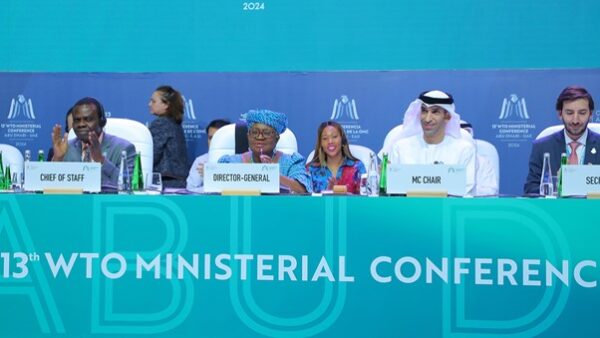The latest World Trade Organisation (WTO) conference concluded after a week of negotiations between its 166 members in the United Arab Emirates with no major agreement on harmful fisheries subsidies.
Many hoped the negotiations at the 13th Ministerial Conference would build on the momentum from the 12th conference in 2022, where agreement was made on subsidies contributing to illegal, unregulated and unreported (IUU) fishing. Additional rules had been put forward to tackle subsidies contributing to overcapacity (i.e. too many vessels fishing the same stocks) and overfishing more broadly.
Oceana’s Senior Analyst Dr. Daniel Skerritt said, “The WTO’s continued failure to prohibit subsidy-driven overcapacity and overfishing jeopardizes the lives of millions of people who depend on healthy fish populations for their livelihoods and food security.”
Oceana Board Member and leading fisheries economist Dr. Rashid Sumaila said, “Today most fish stocks are either fully exploited or overfished. Without fish, it’s game over. Given the massive effort by so many since 2001, the WTO’s failure to take effective action this week to remove overfishing subsidies questions whether the organization is capable of addressing these subsidies at all.”
Some progress
Momentum behind the Fisheries Subsidies Agreement continued to pick up pace, with South Africa presenting its instrument of acceptance to DG Okonjo-Iweala just before the closing of the Conference.
At the conference, ten WTO members — Brunei Darussalam, Chad, Malaysia, Norway, the Philippines, Rwanda, Saudi Arabia, South Africa, Togo, and Türkiye — deposited their instruments of acceptance of the Fisheries Agreement, bringing the total number of WTO members to have formally accepted the Agreement to 71. Part 1 of the agreement will enter into force once 110 WTO members have ratified it.
Addressing delegates at the end of the Conference, the Director General of the WTO, Ngozi Okonjo-Iweala, said “In the second wave of fisheries subsidies negotiations, you narrowed some outstanding gaps, but several more remain,”. “While I had hoped that we could finish these negotiations in Abu Dhabi, you have prepared the ground for its conclusion at the next Ministerial Conference, if not earlier. The livelihoods of 260 million people who depend directly or indirectly on marine fisheries are at stake.”
Missed opportunity
Anna Holl-Buhl, WWF’s Global Lead for the WTO Fisheries Subsidies Negotiations said of the conclusion of the Conference: “This is a huge missed opportunity to end harmful subsidies for overfishing that are threatening the health and well-being of billions of people worldwide who rely on fisheries for their nutrition and livelihoods.”
